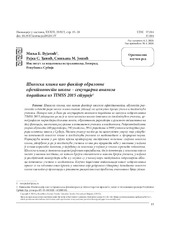Приказ основних података о документу
School climate as factor of educational effectiveness of schools: Secondary data analysis from TIMSS 2015 study
Školska klima kao faktor obrazovne efektivnosti škola - sekundarna analiza podataka iz TIMSS 2015 studije
| dc.creator | Vujačić, Milja | |
| dc.creator | Đević, Rajka | |
| dc.creator | Jošić, Smiljana | |
| dc.date.accessioned | 2021-03-17T13:41:08Z | |
| dc.date.available | 2021-03-17T13:41:08Z | |
| dc.date.issued | 2020 | |
| dc.identifier.issn | 0352-2334 | |
| dc.identifier.uri | http://ipir.ipisr.org.rs/handle/123456789/325 | |
| dc.description.abstract | School climate, as an important factor of school effectiveness, comprises different aspects of school work and strongly impacts the entire learning process, as well as student achievement. Our intention was to determine, using secondary data analysis from the research cycle of TIMSS 2015, whether and how school climate correlates with student achievement, demographic characteristics of schools, principals' education and the length of their engagement in this capacity, school resources, and students' and teachers' behaviour. The representative sample comprised 160 school principals, 192 primary school teachers, 3911 parents, and 3999 fourth-graders from primary schools in Serbia. According to the research findings, no correlation was identified between school climate and student achievement in mathematics and science subjects. By categorising the schools in two groups according to the criterion of extreme values of the scores of school climate, it was determined that student achievement in these two subjects was higher in the schools with an exceptionally favourable school climate, compared to the schools with an extremely unfavourable school climate. School climate correlates with demographic variables, and it is more favourable in schools located in smaller towns, with fewer inhabitants and fewer students, where students have a better access to computers and where there are fewer examples of students' and teachers' inappropriate behaviour. The key pedagogical implications of our research refer to fostering school practices that contribute to creating a positive school climate, such as prevention and resolving discipline-related issues, decreased school enrolment, and providing easier access to information technologies for teachers. The authors of the paper elaborate on the limitations of this research and offer recommendations for further research in this area. | en |
| dc.description.abstract | Školska klima, kao važan faktor školske efektivnosti, obuhvata različite aspekte rada škole i ima snažan uticaj na celokupan proces učenja i postignuće učenika. Namera NAM je bila da sekundarnom analizom podataka iz ciklusa istraživanja TIMSS 2015 utvrdimo da li je i kako školska klima povezana sa postignućem učenika, demografskim karakteristikama škole, obrazovanjem direktora i dužinom angažovanja na toj funkciji, školskim resursima i ponašanjem učenika i nastavnika. Reprezentativni uzorak obuhvata 160 direktora, 192 učitelja, 3911 roditelja i 3999 učenika četvrtih razreda osnovnih škola u Srbiji. Nalazi ukazuju na to da na celokupnom uzorku nije utvrđena povezanost školske klime i postignuća učenika iz matematike i prirodnih nauka. Izdvajajući škole u dve grupe prema kriterijumu ekstremnih veličina skorova školske klime, utvrđeno je da je postignuće učenika iz ova dva predmeta veće u školama u kojima je klima izrazito povoljna, u poređenju sa školama u kojima je klima izrazito nepovoljna. Školska klima je povezana sa demografskim varijablama, te je povoljnija u školama koje se nalaze u manjim mestima, sa manjim brojem stanovnika i manjim brojem učenika, u kojima je dostupnost kompjutera veća i u kojima su u manjoj meri zastupljeni neprimereni oblici ponašanja učenika i nastavnika. Ključne pedagoške implikacije našeg istraživanja odnose se na negovanje onih praksi u školama koje doprinose stvaranju pozitivne školske klime kao što su prevencija i rešavanje disciplinskih problema, smanjivanje broja upisanih učenika i omogućavanje pristupa informacionim tehnologijama nastavnicima. Ukazano je na ograničenja istraživanja i date su preporuke za dalja proučavanja u ovoj oblasti. | sr |
| dc.publisher | Univerzitet u Beogradu - Učiteljski fakultet, Beograd | |
| dc.relation | info:eu-repo/grantAgreement/MESTD/inst-2020/200018/RS// | |
| dc.rights | openAccess | |
| dc.rights.uri | https://creativecommons.org/licenses/by/4.0/ | |
| dc.source | Inovacije u nastavi - časopis za savremenu nastavu | |
| dc.subject | school climate | en |
| dc.subject | TIMSS 2015 | en |
| dc.subject | student achievement | en |
| dc.subject | contextual variables | en |
| dc.subject | secondary data analysis | en |
| dc.subject | školska klima | sr |
| dc.subject | TIMSS 2015 | sr |
| dc.subject | postignuće učenika | sr |
| dc.subject | kontekstualne varijable | sr |
| dc.subject | sekundarna analiza podataka | sr |
| dc.title | School climate as factor of educational effectiveness of schools: Secondary data analysis from TIMSS 2015 study | en |
| dc.title | Školska klima kao faktor obrazovne efektivnosti škola - sekundarna analiza podataka iz TIMSS 2015 studije | sr |
| dc.type | article | |
| dc.rights.license | BY | |
| dc.citation.epage | 28 | |
| dc.citation.issue | 2 | |
| dc.citation.other | 33(2): 15-28 | |
| dc.citation.rank | M24 | |
| dc.citation.spage | 15 | |
| dc.citation.volume | 33 | |
| dc.identifier.doi | 10.5937/inovacije2002015V | |
| dc.identifier.fulltext | http://ipir.ipisr.org.rs/bitstream/id/182/322.pdf | |
| dc.type.version | publishedVersion |

